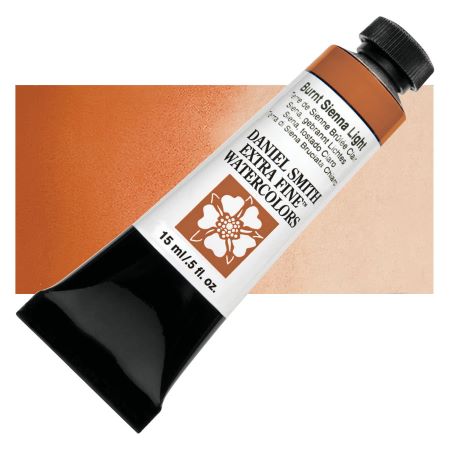Daniel Smith Watercolor - Burnt Sienna Light, 15 ml
Daniel Smith Watercolor - Burnt Sienna Light, 15 ml
ON SALE - 25% OFF.
Discount applied at checkout. We do not offer shipping.
Running low - only 2 in stock!:
Couldn't load pickup availability
Pigment Information
This color contains the following pigments:
PR101-Red Iron Oxide
PO48-Quinacridone Gold
Pigment Name
PR101-Red Iron Oxide
Pigment Type
earth, synthetic
Chemical Name
iron oxides (synthetic), iron oxide, silica, alumina, lime, and magnesia or hydrated iron oxide
Chemical Formula
Fe2O2 or Fe2O3 x H2O
Properties
Red iron oxide varies in hue and transparency, depending on hydration and slight impurities. Indian Red is a slightly duller, deep brick hue with a bluish undertone. It is very dense and opaque, with excellent tinting strength and covering power. It is dependable when mixing with all other permanent pigments and yields good flesh tints when mixed with Zinc White. It is the synthetic version of PR102, which is a pigment made from earth reds, or natural red iron oxides, and the names applied to PR101 and PR102 often overlap. The synthetic red iron oxides have mostly replaced natural red iron oxides and are brighter, stronger, finer, and more permanent. Indian Red is the highest grade bluish shade. Light Red, English Red, and Venetian Red are yellowish shades. Mars Violet is a dull and subdued bluish or purplish oxide.
Permanence
Red iron oxide is very lightfast with excellent permanence.
Toxicity
Red iron oxide has no significant hazards.
History
Natural red iron oxide comes from the mineral ore hematite, called bloodstone by the ancient Greeks from the word hema, meaning blood. It is one of the oldest pigments, has been used by every major civilization, and was an important mineral for medieval alchemists. It was not widely used in artists' materials until the 17th century and was not produced in large quantities until the 18th century.
Pigment Name
PO48-Quinacridone Gold
Pigment Type
organic, quinacridone
Chemical Formula
C20H12N2O2 or C20H10N2O4
Properties
Quinacridone Gold is a high performance pigment. It lacks brightness and cleanliness in tints, and it may disperse unevenly. It has an average drying time. Quinacridone pigments have relatively low tinting strength in general. For this reason, quinacridone colors are often expensive, because more pigment is required in the formulation.
Permanence
Quinacridone Gold has excellent lightfastness and is considered the most lightfast pigment in its shade range.
Toxicity
Quinacridone gold is not considered toxic. Overexposure to quinacridone pigments may cause skin irritation. Quinicridone pigments contain a compound found to be a skin, eye, and respiratory irritant.
History
Although quinacridone compounds became known in the late 19th century, methods of manufacturing so as to make them practical for use as commercial pigments did not begin until the 1950s. Quinacridone pigments were first developed as coatings for the automotive industry, but were quickly adopted by artists.
DJ284600230
TU
1
Watercolors
0.06
DS W/C 15ML BURNT SIENNA LIGHT
Share


